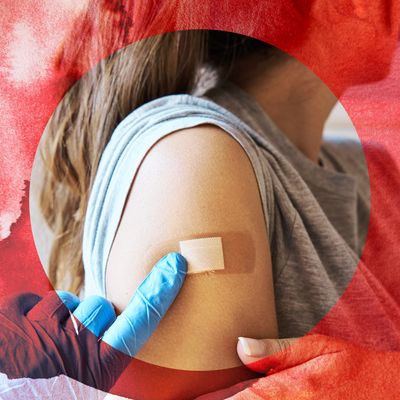
In 2021, as COVID-19 vaccinations became widely available, women started talking about some possible side effects of the jab they were experiencing: menstrual changes including long cycles, short cycles, intense PMS symptoms, and unexpected bleeding. In short, period weirdness.
More than two years and a slew of boosters later, studies and articles are still hashing out whether or not COVID vaccines have a measurable effect on menstrual cycles.
One of the challenges of studying this phenomenon is that the original clinical trials testing the vaccines’ efficacy and safety did not ask the seemingly simple, and to those menstruating bodies, obvious, question: Does this vaccine have an effect on periods?
Researchers have used two main work-arounds to gather data about a possible link between COVID vaccinations and period disruptions: Asking participants to describe any changes to their normal cycle post-vaccination, and sorting through the information collected by period-tracking apps. Seems obvious, but these are both a form of self-reported data, which is less reliable than data collected in a controlled setting. The other challenge with studying menstrual effects is that there’s a lot of natural variation in cycles, and the experience of menstruation changes over time. The pertinent questions around periods and vaccines may be very different for young people who are actively trying to prevent pregnancy, those who are trying to become pregnant, and those going through perimenopause.
While there is still disagreement over the menstrual-related side effects of the COVID-19 vaccine, as well as an open question about whether other vaccinations like the annual flu shot might lead to similar changes, there has been enough research to establish a few solid themes.
Period weirdness is real
Since the COVID vaccine was introduced, there have been more than 100 studies published that have examined some aspect or another of menstrual cycles following vaccination. The studies have been conducted worldwide, though far more in the U.S. and Europe. The most common questions researchers have asked have been about cycle length and abnormal symptoms (like a heavier flow or more pain than usual), as well as a few studies looking into possible effects on fertility.
One meta-analysis determined that the majority of studies, in which 78,138 vaccinated women participated, did find fluctuations in both the length of cycles and in menstrual symptoms, and that these changes usually only lasted for one cycle. It also identified an almost laughably broad set of people for whom period fluctuation was more likely to occur: Not only was age predictive of irregularity, but also, “smoking, history of pregnancy, and second dose of vaccine.” This study did not look at possible fertility changes.
Overall, the body of work looking at COVID vaccines and periods has been observational in nature, trying to discern whether there is an observable correlation between an extra-long, or short, or heavy, or painful period and vaccination. Causation, or the question of why there might be changes at all, has been addressed largely as a list of possibilities for further study. In studies that affirmed a link between vaccinations and menstrual irregularities, the vast majority seem to be written with vaccine hesitancy in mind, noting that the vaccines are safe and that the changes in question are likely the result of an immune response, not a reaction to the vaccine or any ingredient in it.
One of the persistent practices in these studies is dismissing those small changes — for example, a 29-day versus a 28-day cycle or heavier bleeding than typical — as just that, statistically insignificant changes. A small change that’s an expected occurrence within the normal fluctuations of an individual cycle. A study that came out of Boston University found that the length of menstrual cycles increased by 1.1 days after the first dose of the mRNA vaccine, and by 1.3 days after the second. The university’s press release stated, “The vaccines are likely not to blame for any major changes to the menstrual cycle.”
A day or a day-and-a-half difference in a menstrual cycle may not seem like a big deal on paper, but dismissing period concerns because of a small but noticeable effect can feel a lot like medical gaslighting. Whether you’re tracking your cycle because you want to get pregnant, freaking out because you definitely don’t and your period is late, or wondering whether the extremely heavy period you just had is a sign of perimenopause, any menstruating person knows that those small changes make a big difference to the experience of actually existing in a body day-to-day.
“Bottom line with the menstrual cycle that I want to really emphasize is that there’s a lot of natural variation that occurs,” says Dr. Leo Han, a professor of obstetrics and gynecology and a practicing OB/GYN at Oregon Health and Science University (OHSU). He emphasized that in the three studies that OHSU has done on the effects of the vaccine on menstrual cycles, all based on data gathered from period-tracking apps, fluctuations following vaccination have been documented, but the effects usually only lasted for a single cycle.
It isn’t all in your head — but your brain is involved
A common complaint about post-vaccination menstrual changes is that many doctors dismissed the idea that the vaccine could be the underlying cause, instead asking women whether they were experiencing an unusual amount of stress. In 2021, after more than a year of surges and declines in the numbers of COVID infections, accompanied by lockdowns, school closures, and a contentious national election, followed by an attempted overthrow of the U.S. Capitol, the answer was a resounding, “Of course I am! But I still want to know why my period was late and then nightmarishly heavy.”
While Han recognizes that in many cases women’s valid concerns were being facilely dismissed as false, he did emphasize that the brain plays a major role in menstruation, and that stress can interrupt even the most regular of cycles. “People always think, ‘Oh, estrogen, ovaries.’ Actually, the menstrual cycle is controlled by your brain,” he says. Your pituitary gland, which is located in the hypothalamus, coordinates the timely release of hormones throughout the body, including those that control your period. Han says that while there is no clear consensus on why COVID vaccines, and potentially COVID infections, have the potential to interrupt periods, one working theory is that it’s the stress on the body, including the brain.
Timing matters
Not everyone experiences changes to their menstrual cycle following vaccination. Some of this can be explained by timing, says Han. Vaccination that occurs after ovulation is far less likely to have an effect on the next cycle. But if you got vaccinated before ovulation, “it’s probably a delay in ovulation or changing the timing of ovulation,” during your next period that leads to noticeable changes, he explains.
Menstrual changes matter, some more than others
A Norwegian research team recently published a study that found that women who did not typically menstruate, because of hormonal birth control, menopause, and other factors, were more likely to experience unexpected bleeding after receiving an mRNA vaccination for COVID-19. While the study, which was based on self-reported data, did not determine why this bleeding had occurred, it did raise concerns about whether women had sufficient information about post-menopausal bleeding, which in some cases can be a symptom of uterine cancer.
“We were surprised to see that even within this quite well-educated and health-conscious population, few women reported that they had sought health care after experiencing postmenopausal bleeding,” Dr. Kristine Blix, the lead author on the study, wrote in an email. “Overall, only 31 percent of women with postmenopausal bleeding stated that they had seen a doctor for vaginal bleeding or abdominal pain. Women with postmenopausal bleeding should be encouraged to seek health care, as recommended in guidelines.”
What about the next vaccine?
These studies point to the need for both more detailed meta-analyses that can provide women with more concrete advice about whether, for example, it would be wise to schedule a certain amount of space between a round of IVF or other fertility treatments and vaccination or a booster, and to the persistent lack of actual medical clarity on why the immune response to these vaccines leads to menstrual changes.
Dr. Katalin Karikó and Dr. Drew Weissman, two researchers at the University of Pennsylvania, were just awarded the Nobel Prize in Medicine for their work developing mRNA vaccines. And the technique may become the frontier of personalized cancer treatments. As medicine moves ahead, it also needs to look back at its mistakes in leaving bodies that are biologically female out of research all too often.
The lack of data about the vaccine and menstruation in the initial clinical trials was not some kind of shortcut but standard procedure. It was and is a reminder that in medicine, the default patient is usually male. The very public discussion of a possible connection between menstrual side effects and the COVID vaccine has brought to light a lack of research into women’s health in general. “It’s horrifically small,” Han says of the National Institute of Health budget for research specifically dealing with women’s health. “It’s an atrocity in most of our opinions.”
More From This Series
- The Best Period Products for Trans Men and Nonbinary People
- How to Safely Skip Your Period
- Is Your Body Out of Sync With a Man’s World?




